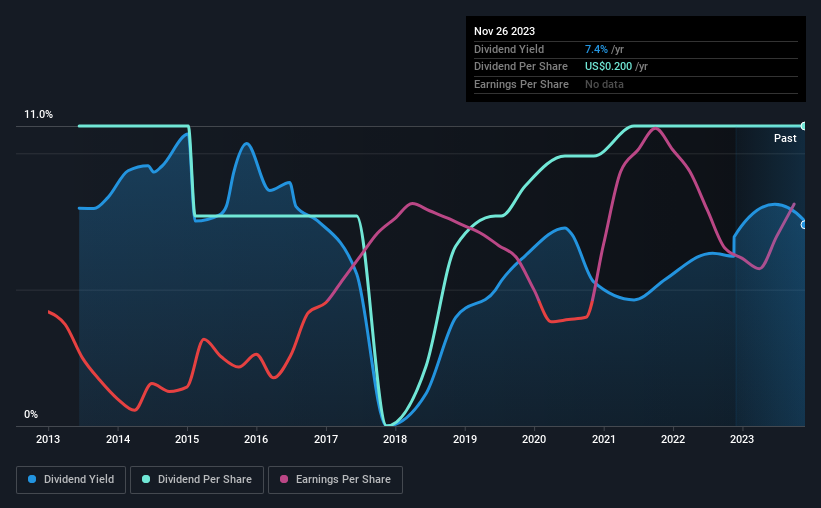Deswell Industries, Inc. (NASDAQ:DSWL) Pays A US$0.10 Dividend In Just Three Days
Regular readers will know that we love our dividends at Simply Wall St, which is why it's exciting to see Deswell Industries, Inc. (NASDAQ:DSWL) is about to trade ex-dividend in the next 3 days. Typically, the ex-dividend date is one business day before the record date which is the date on which a company determines the shareholders eligible to receive a dividend. The ex-dividend date is an important date to be aware of as any purchase of the stock made on or after this date might mean a late settlement that doesn't show on the record date. Meaning, you will need to purchase Deswell Industries' shares before the 30th of November to receive the dividend, which will be paid on the 21st of December.
The company's next dividend payment will be US$0.10 per share. Last year, in total, the company distributed US$0.20 to shareholders. Last year's total dividend payments show that Deswell Industries has a trailing yield of 7.4% on the current share price of $2.71. Dividends are a major contributor to investment returns for long term holders, but only if the dividend continues to be paid. So we need to investigate whether Deswell Industries can afford its dividend, and if the dividend could grow.
Check out our latest analysis for Deswell Industries
Dividends are typically paid from company earnings. If a company pays more in dividends than it earned in profit, then the dividend could be unsustainable. Deswell Industries paid out 52% of its earnings to investors last year, a normal payout level for most businesses. That said, even highly profitable companies sometimes might not generate enough cash to pay the dividend, which is why we should always check if the dividend is covered by cash flow. What's good is that dividends were well covered by free cash flow, with the company paying out 24% of its cash flow last year.
It's positive to see that Deswell Industries's dividend is covered by both profits and cash flow, since this is generally a sign that the dividend is sustainable, and a lower payout ratio usually suggests a greater margin of safety before the dividend gets cut.
Click here to see how much of its profit Deswell Industries paid out over the last 12 months.
Have Earnings And Dividends Been Growing?
Companies that aren't growing their earnings can still be valuable, but it is even more important to assess the sustainability of the dividend if it looks like the company will struggle to grow. If earnings decline and the company is forced to cut its dividend, investors could watch the value of their investment go up in smoke. With that in mind, we're not enthused to see that Deswell Industries's earnings per share have remained effectively flat over the past five years. We'd take that over an earnings decline any day, but in the long run, the best dividend stocks all grow their earnings per share.
Another key way to measure a company's dividend prospects is by measuring its historical rate of dividend growth. It looks like the Deswell Industries dividends are largely the same as they were 10 years ago.
The Bottom Line
From a dividend perspective, should investors buy or avoid Deswell Industries? We're not enthused by the flat earnings per share, although at least the company's payout ratio is within reasonable bounds. Additionally, it paid out a lower percentage of its free cash flow, so at least it generated more cash than it spent on dividends. All things considered, we are not particularly enthused about Deswell Industries from a dividend perspective.
If you want to look further into Deswell Industries, it's worth knowing the risks this business faces. In terms of investment risks, we've identified 2 warning signs with Deswell Industries and understanding them should be part of your investment process.
A common investing mistake is buying the first interesting stock you see. Here you can find a full list of high-yield dividend stocks.
Have feedback on this article? Concerned about the content? Get in touch with us directly. Alternatively, email editorial-team (at) simplywallst.com.
This article by Simply Wall St is general in nature. We provide commentary based on historical data and analyst forecasts only using an unbiased methodology and our articles are not intended to be financial advice. It does not constitute a recommendation to buy or sell any stock, and does not take account of your objectives, or your financial situation. We aim to bring you long-term focused analysis driven by fundamental data. Note that our analysis may not factor in the latest price-sensitive company announcements or qualitative material. Simply Wall St has no position in any stocks mentioned.

